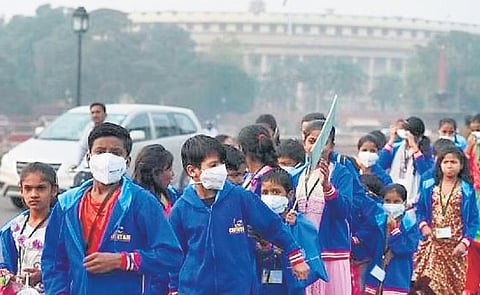

NEW DELHI: The Commission for Air Quality Management (CAQM) announced a partial relaxation of restrictions under GRAP Stages III and IV on Monday evening, permitting schools and colleges in Delhi-NCR to operate in a hybrid mode. This decision enables students to choose between attending classes online or physically.
The education department followed up with an official notification allowing the hybrid model, but the move has sparked debates among parents. Many questioned whether schools and teachers are adequately equipped to conduct hybrid classes. “Are your schools and teachers equipped with tools to conduct hybrid classes? Do your teachers have the zeal to make extra efforts for students?” some parents posted on their social media accounts.
While several parents expressed relief over the flexibility, particularly for working families, concerns persisted regarding the readiness of schools and the impact on children lacking access to online education.
The CAQM’s order stated, “State governments in the NCR shall ensure that all classes up to 12th Standard are conducted in a ‘hybrid’ mode, i.e., both in ‘physical’ and also in ‘online’ modes, wherever online mode is feasible within the NCT of Delhi and the districts of Gurugram, Faridabad, Ghaziabad, and Gautam Buddh Nagar in the NCR.” However, complaints surfaced online, alleging that some schools are pressuring students to attend physical classes without consulting parents.
Meanwhile, Randeep Guleria, former Director of AIIMS, voiced his concerns during a discussion at the Delhi Dialogue programme on Tuesday. He criticized the hybrid model amidst the pollution crisis and said, “It’s a big debate, and it doesn’t make sense. It’s a wastage of education, especially for children without access to online classes. They don’t even have smartphones.” Guleria added, “It’s like creating a Covid like situation.”
In an interview with Sumit Vohra, founder of the NurseryAdmissionsPortal.com, who also heads the Parents Association in Delhi, Ifrah Mufti discusses the most pressing issue and possible solutions. Excerpts.
As a parent, do you feel children are benefitting from online classes?
Yes, online classes are beneficial in such situations as children are not exposed to the poor air quality. However, online classes cannot fully replace the experience of physical classes.
Should schools reopen amid the air quality crisis in the national capital?
I am satisfied with the government’s decision to implement a hybrid mode. It’s especially beneficial for nuclear families with working parents who cannot leave their children at home alone. Those who feel it is unsafe can continue with the online option.
Are children fully attending the classes?
While online classes are conducted, ensuring attendance and engagement can be challenging. Many students, particularly younger ones, might skip online classes or engage in other activities like playing games, watching videos, while parents or guardians assume that they are attending the online classes.
What about children from underprivileged families who lack access to online classes?
This is a critical issue. Many low-income families lack reliable internet connections, smartphones, or computers, making virtual learning inaccessible. Even when devices are available, data costs are often prohibitive. As a result, these children often miss out on essential educational opportunities.